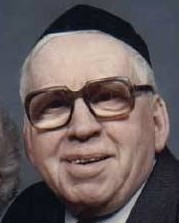
(1908-2003)
Reverend Samuel Benaroya is a descendant of one of the most renowned families of musicians from Edirne, Turkey, where he was born in 1908, the youngest of five brothers and two sisters. He began his career as a singer at the age of six in the choir of the “Kahal Grande” synagogue. At the age of 17 he already conducted this choir and at the age of 20 he joined the Maftirim where he studied with his uncles HaRibi Avraham Bahar, Avraham Bekhor Menahem, and also with Rabbi Haim Bejerano (Chief Rabbi of Turkey), Yehuda Hasid, Ben Sion Yeroham and the poet Haim Benaroya. His father, Haham Yishak Benaroya, was a Hazzan in Edirne for 60 years.
In 1934, he moved to Geneva, Switzerland where he served as cantor of the local Sephardic community of Turkish Jews. In 1939 he went back to Edirne to marry Lisa (nee Benozillo z”l) and returned to Geneva where they lived and raised one daughter, Judith (Amiel). During WWII, Rev. Benaroya played a major role in bringing refugees to safety into Geneva from bordering France, often risking his personal safety.
At the request of the Sephardic Bikur Holim Congregation, Rev. Benaroya and his family immigrated to Seattle in 1952. It was in Seattle that he was able to pursue his life-long goal of preserving Turkish-style Sephardic liturgical melodies and traditions through education. Through the years, he has taught generations of young men enabling them to lead Shabbat and holiday services, read Torah, blow Shofar, and chant liturgical poetry in Hebrew and Ladino. Because of his efforts those who became his students were able to apply their knowledge into the communities where they now reside.
As a strong advocate for Jewish education, Rev. Benaroya fought for the establishment of a Jewish high school, and worked hard for the success of the Yeshivat Or Hatzafon (now the Northwest Yeshiva High School). Since its beginning, he took great pride and particular interest in its students who called SBH their synagogue.
Rev. Benaroya was a composer of numerous melodies in the classical Turkish style, enjoying in particular partnering familiar melodies with parts of the synagogue service. For example, after the 1973 Yom Kippur War he fitted the newly-popular melody “Yerushalayim Shel Zahav” to a portion of the Mussaf service. It is now sung in many Sephardic and Ashkenazic communities.
Among the most familiar in our community and around the US is the Sephardic Birkat Hamazon (Grace After Meals) to which Rev. Benaroya, back in 1972, provided both familiar and unfamiliar tunes to be adapted within the paragraphs of the prayer. Like the Ashkenazim, the Sephardim now have a Birkat Hamazon whose melodies could be sung, thanks to the Reverend’s adaptations.
In 1998, Professor Edwin Seroussi, of The Hebrew University of Jerusalem and The Jewish Music Research Centre, released a CD entitled Ottoman Hebrew Sacred Songs – Performed by Samuel Benaroya, representing a part of a comprehensive research project on Ottoman Hebrew sacred poetry and music. The recording became a last minute effort to save the vanished lore of Rev. Benaroya’s fellow Ottoman Jewish musicians, most of whom remained unrecorded. The scarcity of Hebrew Ottoman recordings enhances the value of this documentation.
“He was perhaps the last representative of a 400-year-old tradition of Turkish Jewish cantors who were experts in the singing of liturgical music according to Ottoman court music,” according to Professor Edwin Seroussi, director of the Jewish Music Research Centre at The Hebrew University of Jerusalem.
Rev. Benaroya established the first functioning office of SBH where he served as bookkeeper, fundraiser and general manager. For many years he also worked as bookkeeper for the Seattle Sephardic Brotherhood and received their Man of the Year Award. He was an active member of many Jewish organizations in Seattle, and has received countless meritorious awards and recognition plaques.
It might be interesting to note that the title “Reverend” was added to Hazzan Benaroya’s name prior to his arrival into the United States. The late Washington Senators “Scoop” Jackson and Warren Magnuson were credited with the idea that would permit special entrance (without quota) into the U.S. for permanent residence by the Benaroya family. The stipulation being that Rev. Benaroya was to use the title in every document.
As of 2003, Rev. Benaroya had two grandsons (their wives) and 4 great-grandsons – Simon (Amy), Sammy and Ori, and Sam (Anna), Elie and Refael. Together with his beloved wife, Lisa, they worked tirelessly and with enormous dedication and devotion for their community and especially for their synagogue. For decades prior to her death in 1994, Mrs. Benaroya (“Mrs. B” as she was fondly called) helped in all fundraising efforts of the synagogue and its Ladies Auxiliary, especially playing a key role in the annual bazaar. Together, Rev. and Mrs. Benaroya were a team that energized others with their enthusiasm and hard work to get involved with various projects that would benefit the congregation. The Ezrat Nashim (the ladies’ section) of the Sephardic Bikur Holim synagogue is named in their honor.
Rev. Samuel Benaroya, z”l, passed away in Seattle, Washington on Thanksgiving day 2003 at the age of 95.
Source: Congregation Sephardic Bikur Holim here
